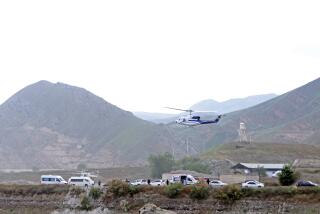More Bad Weather Forces Delay of Shuttle Liftoff
For the second day in a row, thunderstorms Saturday delayed liftoff of the space shuttle Atlantis on the first U.S. mission to dock with a Russian spacecraft in 20 years.
NASA gave up 45 minutes before the scheduled launch, reluctantly extending American astronaut Norman E. Thagard’s record-breaking stay on the Russian space station Mir. He has been there since mid-March.
Launch officials said they would try again Tuesday. Bad weather is expected until at least then. Complicating matters, NASA has a launch window of only seven to 10 minutes on each attempt to send Atlantis on the most fuel-efficient path to Mir.
“See you Tuesday for a launch,” commander Robert (Hoot) Gibson said before climbing out of the shuttle.
“Hopefully by then, Hoot, we won’t have as much liquid sunshine,” launch director Jim Harrington replied.
Unlike Friday, when lightning prevented fueling, NASA was able to pump a half-million gallons of propellants into Atlantis and the seven astronauts and cosmonauts climbed aboard. But it cost the space agency $900,000 in fuel and overtime pay. Shuttle operations director Bob Sieck said some of that would have been spent anyway.
Lightning struck the launch pad Saturday before the shuttle crew got there, but nothing was damaged because of the elaborate protection system, NASA officials said. The rain was so intense at times that the pad could not be seen from three miles away.
The National Aeronautics and Space Administration wanted to launch the shuttle as soon as possible because, for the first time in 34 years of U.S. human space flight, people were waiting in orbit for a ride home.
Thagard and his two Russian colleagues, Vladimir Dezhurov and Gennady Strekalov, have been on Mir for more than three months. That’s short by Russian standards, but it represents a U.S. space endurance record. The three are to be replaced by two Russian cosmonauts flying on Atlantis.
Russian space officials, while sympathetic with NASA’s weather woes, are not used to launch delays. Many of them planned to return to Russia today.
“This is an unusual situation for us because we normally launch exactly on time,” said Yuri Semenov, president of the Russian aerospace company RSC Energia. “To my knowledge, I can remember only about two delays because of engineering problems.”
Thagard and his Mir mates are by no means stranded. If necessary, the three men could return to Earth in a Russian Soyuz capsule.
Semenov said Atlantis must be aloft by August, when a Russian and European crew is scheduled to be launched to Mir from Kazakhstan.
The last time U.S. and Russian spacecraft docked in orbit was in July, 1975.
More to Read
Start your day right
Sign up for Essential California for news, features and recommendations from the L.A. Times and beyond in your inbox six days a week.
You may occasionally receive promotional content from the Los Angeles Times.






